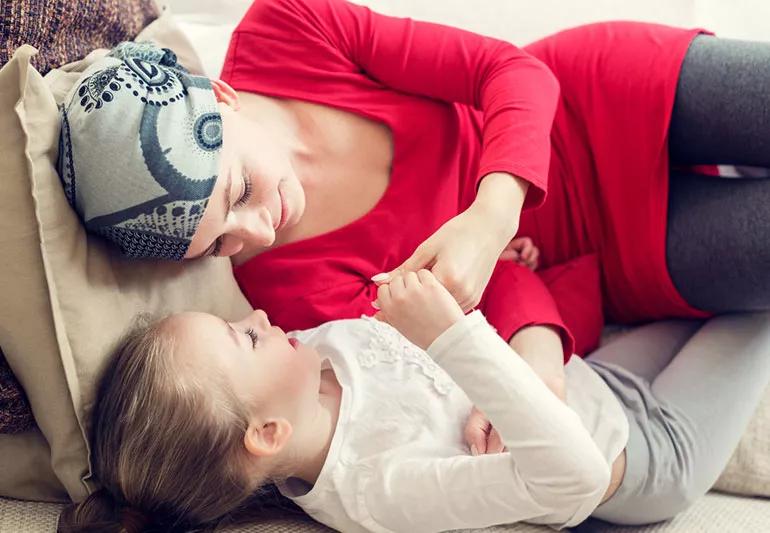Why some treatments need a little extra caution

Image content: This image is available to view online.
View image online (https://assets.clevelandclinic.org/transform/8bcf286a-2593-4459-813f-3d5dac9a32c0/cancerRadiationTreatment-950644082-770x533-1_jpg)
A girl and her mom holding hands.
If you’re undergoing treatment for cancer, you know that the medicines and procedures have side effects. You may worry that these lifesaving treatments could somehow be harmful to your loved ones. It’s a concern that many with cancer and their family members often have, says cancer care nurse Josette Snyder, BSN, MSN, AOCN.
Advertisement
Cleveland Clinic is a non-profit academic medical center. Advertising on our site helps support our mission. We do not endorse non-Cleveland Clinic products or services. Policy
The two most common types of cancer treatment that patients and their family members worry about are chemotherapy and radiation therapy. Here Snyder explains what you and your loved ones need to know about each.
Some people with cancer who receive radiation therapy worry that their bodies will become “radioactive” after they receive radiation treatment. Their concern is that close physical contact with others could expose them to radiation.
“The general answer to this concern is that physical contact is fine,” Snyder says. However, there are some exceptions.
The exceptions usually have to do with whether a person is receiving external or internal radiation.
External radiation is when the radiation comes from a source outside the body, she explains. “A special device sends strong beams of energy to cancer cells to kill them or keep them from growing and dividing,” she says. “Small doses of radiation may be administered daily over a period ranging from several days to several weeks. The treated tissue does not continue to hold the radiation after the therapy session ends. So patients receiving external beam radiation need not worry about transmitting radiation to their loved ones.”
Internal radiation means that the radiation source is put into the body, Snyder says. Some examples of internal radiation are brachytherapy, in which doctors implant a seed, ribbon or wire that contains radiation in or around a tumor, the implant emits a dose of radiation to the surrounding area that kills cancer cells. Another example of internal radiation is radioactive iodine that is swallowed for treatment of certain thyroid conditions.
Advertisement
When a patient is treated with internal radiation, the radiation source may be left in the body for a short time and then removed before the patient leaves the treatment facility. If this is the case, the treated tissue does not hold the radiation, and so contact with others is not a problem, Snyder says.
The situation is slightly different with internal radiation. “If you have implanted radiation, your health care team likely will give you advice about close physical contact for the next few months,” she says. “Much depends on the type of cancer being treated.”
If the radiation source is left in place, the amount of radiation lessens over time. However, the possibility of exposure to others is present.
The radiation oncology team will instruct patients who receive internal radiation about how long and in what situations it is OK for patients to be near others.
“For example, there may be no problem with sitting next to the person who is driving you home from the treatment appointment during which radioactive seeds were implanted to treat prostate cancer,” she says. “But you would not hold a child, puppy or kitten under a year old on your lap, or hug a pregnant woman for at least two months after the seeds have been implanted.”
Your healthcare team will advise you on the specifics. Be sure to ask your team if you have any particular concerns or are unsure.
Snyder says some patients wonder whether it’s safe to have close physical contact with another person while they are receiving chemotherapy.
“When we talk about being safe with chemotherapy patients, we really are talking about exposure to the chemotherapy medication,” she says. For the most part, after a patient receives chemotherapy, the medications stay in the patient’s body for about 24 hours to 48 hours.
The body clears itself of the medications through body fluids such as urine or stool, so this means avoiding contact with these body fluids. If you are cleaning up the body fluids of a chemotherapy patient, wear gloves and wash your hands afterward, she advises.
Kissing and more intimate physical contact is perfectly fine. Male chemo patients, however, should use a condom for the first 48 hours after a chemo treatment, she notes.
Advertisement

Sign up for our Health Essentials emails for expert guidance on nutrition, fitness, sleep, skin care and more.
Learn more about our editorial process.
Advertisement
Chemo cold caps may help you keep more of your hair during therapy
Practice meditation together, make a unique-to-them care package and embrace emotions
From a thoughtful note to a special pillow, these items are a win
How to create your own organizational system
Take these steps to limit the damage
The short answer from an exercise physiologist
The short answer from an oncologist
10 things that can help ease your mind and keep you comfortable
Prioritize your health by managing stress, strengthening your social connections and getting quality sleep
Bolsters, blankets, pillows and blocks can offer extra support, stability and comfort
Allergies, postnasal drip, asthma or reflux could be to blame for a cough that won’t quit